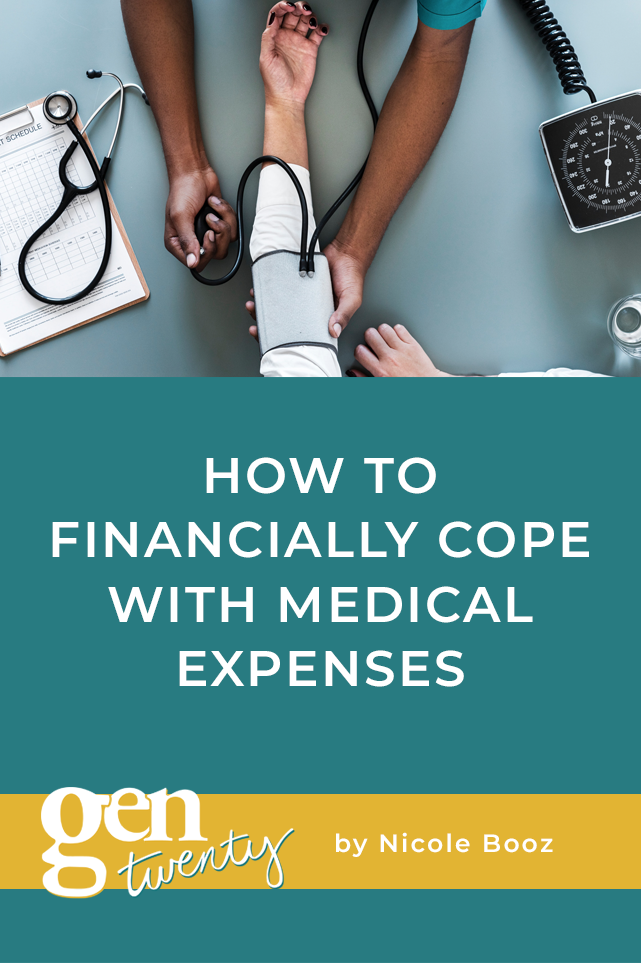This post is sponsored by Lexington Law.

Did you know that health-related debt is one of the leading causes of bankruptcy in the United States? Even with health insurance, you might be left with unexpected medical bills and expenses. Depending on your plan, there may be things that aren’t covered, leaving you to foot the bill yourself.
These unexpected expenses can be a budget, savings, and credit killer. To help you navigate the situation, here are four ways to help you financially cope with medical expenses. Your health is important and your finances and credit shouldn’t suffer because of it.
How To Financially Cope With Medical Expenses
1. Negotiate your bill.
Ask the hospital or provider for a breakdown of your bill to your account. The report may contain billing mistakes as an oversight. Don’t be afraid to look at your charges and be sure you we’re provided these services. Talk to the billing department to make sure everything is correct.
Be polite when negotiating. While you might be upset over your bill, the people in the billing department are still people. There’s no need to yell at them or be rude when they’re the people who will help you navigate your bill.
Typically if you are working with the hospital to pay off the bill, they will be less inclined to send the bill to collections. You can negotiate a lower rate if you can offer cash payment, negotiate a monthly payment based on your income, or possibly offer you a no-interest payment plan. If you do make payments, as you get closer to the end, you may be able to negotiate paying a larger lump sum instead of finishing out the payments for a discount.
Don’t throw your hands up in the air and feel helpless! There’s most likely something that can be done to reduce the financial burden of a medical bill.
2. Don’t pay your bill with a credit card.
If you have a credit card with enough credit available, it might be tempting to put the bill on that. However, there are some downsides to doing so.
If you’re putting a larger balance on your credit card, chances are you don’t have enough funds on hand to pay the bill in full. This means a balance is going to sit on your card for several months, even years, accumulating high interest charges.
Adding a high charge to your credit card can also disrupt your credit utilization ratio. When this is higher than 30%, it can affect your credit score as the utilization ratio makes up 30% of your credit score. Keep in mind that unless medical bills are sent to collections, they usually remain absent on your credit report. But if you put the balance on a credit card, that will show up on your report.
Paying your medical bill with a credit card and then leaving that balance can also affect your credit in the long-term. Lowering your credit score can impact your interest rates for home ownership, buying a car, taking out a loan, future employment, and even your insurance rates.
![]()
3. Evaluate your budget.
Chances are you will have to pay something towards your medical bill. Obviously the quicker you can pay it off, the better — but this isn’t always practical.
If you don’t have an emergency fund to dip into, you’ll most likely have to tighten your budget for the next few months.
Be realistic about what you can and can’t truly afford to pay on a monthly basis. Negotiating your bill with the hospital or doctor’s office can provide you with lower payments, but knowing what you can afford without putting too much financial pressure on you each month is key.
Look at your expenses and see what you can cut for the next six to twelve months. The sooner you can pay off the bill, the better off you will be in the long run. The short term sacrifices will be worth it.
4. Know your legal rights.
A Consumer Finance Report from 2014 shows that approximately 52% of collections on consumer reports come from medical debt. However, this isn’t always a fair and accurate representation of their credit worthiness. For example, you could have excellent credit until an unexpected medical bill leaves you with damaged credit, further impacting your future options.
The FICO 9 scoring model takes into account medical collections, but weighs them less heavily with other items on your credit report to calculate your score. Lenders using this model will have a more accurate picture of your credit worthiness.

Additionally, as part of the New York State Attorney General settlement, the credit bureaus have to wait 180 days before reporting medical debt to your credit report. This gives time to sort out insurance issues and/or make payments. As part of this same settlement, the bureaus also have to remove medical debts from your credit report as soon as insurance pays them.
There are also federal laws that protect your privacy for reporting issues around your health. If medical expenses are affecting your credit, there may be inaccurate reporting happening that you are unaware of. If you’re unsure of what your rights are and what healthcare providers can and cannot report to the credit bureaus, reach out the the consultants at Lexington Law for a consultation.
They offer a specific medical expenses credit repair track and will advocate on your behalf to make sure what is on your credit report is accurate. Don’t let unfair and inaccurate reportings affect your life and finances.
When it comes to medical bills, you have rights and options to help you cope with medical expenses. Though health emergencies arise, and with them unexpected bills along with them, you don’t need to feel helpless.
